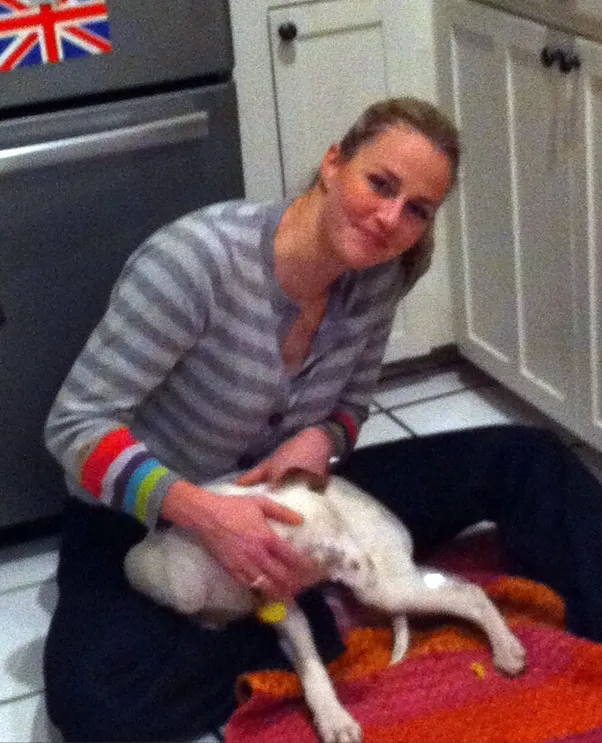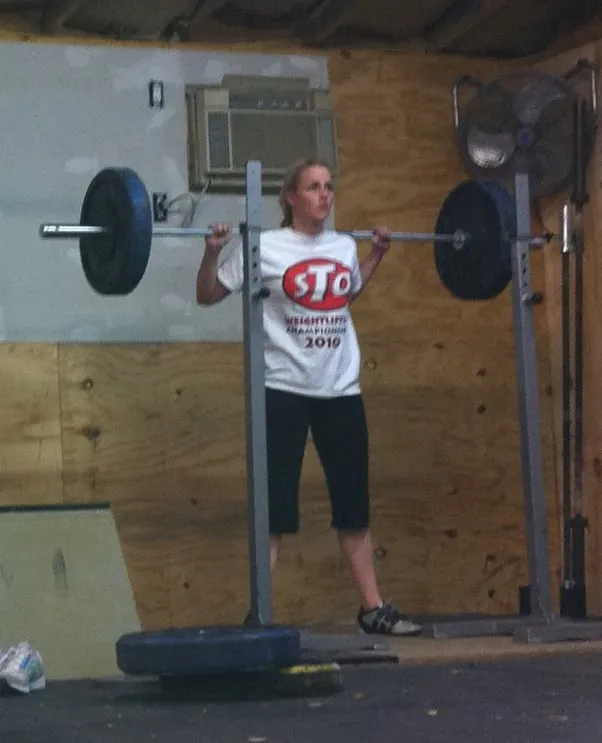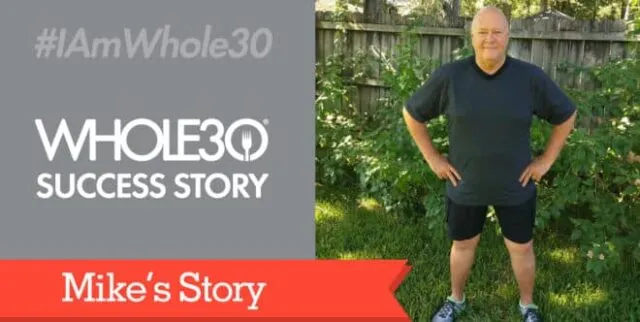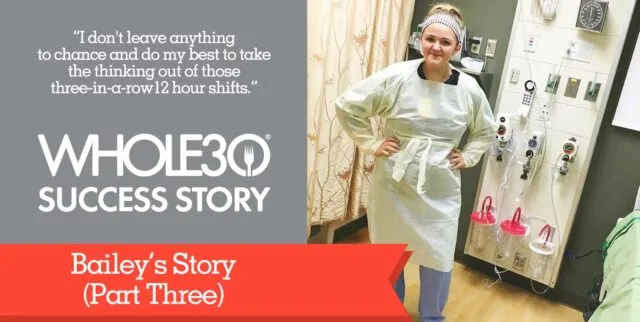While many have had life-changing results from ourWhole30 program, once in a while we have the opportunity to delve into more complicated “problem solving mode” with our consulting practice. A few months ago, we had such an opportunity with Meggie D., a type 1 diabetic who was having trouble controlling her blood sugars, despite a generally healthy (low-carb/Paleo) diet. We worked with her closely for about a month, making very specific recommendations for meal timing, macronutrient proportion and food choices. This is Meggie’s story.
My experience with Whole30 and Type 1 Diabetes
by Meggie D.  “First of all, this is not going to be a fantastical story of diabetes reversal, so prepare yourself. I was diagnosed with Type I diabetes at the age of 11, and I am currently 27 years old. Over those past 16 years I have kept a pretty average control on my levels (Average being an HbA1c that was usually in the 6-7.5 range). Most of this time was spent on the high-carb diet recommended to me by my doctors. Within the past 3 years I have tried the low carb style of eating and later the paleo style of eating. For me low carb is completely essential for a Type I Diabetic, and paleo is close behind. Diabetes is an ongoing guessing game and balancing act of activity to carbs to stress levels. When you remove the carbohydrates from the equation you greatly reduce the volatility in the guess. With the (modified) paleo lifestyle my HbA1c levels are consistently under 6. My insulin levels are also slightly reduced as I am not eating as many carbs. My Endocrinologist/Nutritionist however, hates this diet. Her reasonings were as follows: Decreasing carb intake would significantly impact my energy throughout the day. No whole grains means I will not be getting enough fiber. No whole grains also means I am missing so called “crucial nutrients.” Too much fat will cause heart disease and high triglycerides. (The list goes on.) Although I have eaten a modified paleo diet for the past year and a half, I was still having problems with morning highs. I wear a continuous glucose meter (CGM) which gives me a moving average of my blood sugar over time. This allows me to see and correct for unexplained highs/lows. I was noticing that my levels would stay perfectly flat all night at around 100 then I would wake up and eat breakfast and see a spike shortly after sometimes as high as 250! Breakfast, I should mention was always the same: three eggs, ¼ of an avocado and a dash of hot sauce. Pretty low on the carbs – yet I was routinely giving myself a correction bolus mid morning. It is likely that this was something I struggled with over a long period of time; however the CGM really shed some light on the problem. Enter Dallas and Melissa. We chatted extensively about my nutrition, blood sugars and overall stress levels. Dallas and Melissa love a good problem, and immediately set to work on coming up with a variety of practical, immediately applicable recommendations. I went on a specially customized version of their Whole30 program, designed to both improve my overall blood sugar management and, most importantly, eliminate my morning blood sugar highs.
“First of all, this is not going to be a fantastical story of diabetes reversal, so prepare yourself. I was diagnosed with Type I diabetes at the age of 11, and I am currently 27 years old. Over those past 16 years I have kept a pretty average control on my levels (Average being an HbA1c that was usually in the 6-7.5 range). Most of this time was spent on the high-carb diet recommended to me by my doctors. Within the past 3 years I have tried the low carb style of eating and later the paleo style of eating. For me low carb is completely essential for a Type I Diabetic, and paleo is close behind. Diabetes is an ongoing guessing game and balancing act of activity to carbs to stress levels. When you remove the carbohydrates from the equation you greatly reduce the volatility in the guess. With the (modified) paleo lifestyle my HbA1c levels are consistently under 6. My insulin levels are also slightly reduced as I am not eating as many carbs. My Endocrinologist/Nutritionist however, hates this diet. Her reasonings were as follows: Decreasing carb intake would significantly impact my energy throughout the day. No whole grains means I will not be getting enough fiber. No whole grains also means I am missing so called “crucial nutrients.” Too much fat will cause heart disease and high triglycerides. (The list goes on.) Although I have eaten a modified paleo diet for the past year and a half, I was still having problems with morning highs. I wear a continuous glucose meter (CGM) which gives me a moving average of my blood sugar over time. This allows me to see and correct for unexplained highs/lows. I was noticing that my levels would stay perfectly flat all night at around 100 then I would wake up and eat breakfast and see a spike shortly after sometimes as high as 250! Breakfast, I should mention was always the same: three eggs, ¼ of an avocado and a dash of hot sauce. Pretty low on the carbs – yet I was routinely giving myself a correction bolus mid morning. It is likely that this was something I struggled with over a long period of time; however the CGM really shed some light on the problem. Enter Dallas and Melissa. We chatted extensively about my nutrition, blood sugars and overall stress levels. Dallas and Melissa love a good problem, and immediately set to work on coming up with a variety of practical, immediately applicable recommendations. I went on a specially customized version of their Whole30 program, designed to both improve my overall blood sugar management and, most importantly, eliminate my morning blood sugar highs.  During this time I continued to wear my CGM and monitor my blood glucose to see the effects of removing certain foods (as recommended) from my current eating regime. I immediately noticed that the morning spikes began to level out, and instead of a drastic jump to 250 my jumps went from 100 to 150. After the 30 days ended, and I began to slowly add food items back into my diet. I noticed that the biggest positive effect came from the addition of extra veggies, especially in the morning. To this day I try and get a full load of vegetables at each meal to help regulate and even out my blood sugars. My customized Whole30 program was an invaluable in helping me pinpoint idiosyncrasies in my control of diabetes. The concept of running my own test experiment on myself through what I put in my body gave me a concrete and revealing conclusion about the changes I needed to make to see the results I was looking for. I am currently on day 12 of my second Whole30 program, and am looking forward to the new findings my body reveals. My blood sugars have been great, and I am excited to see what my new HbA1c level is at my next doctor’s visit. Thank you to Melissa and Dallas for your dedication to helping me identify the factors to change my control on diabetes. Your support and insight are invaluable resources to those of us looking for progression in a variety of setbacks whether medical, strength or emotional.”
During this time I continued to wear my CGM and monitor my blood glucose to see the effects of removing certain foods (as recommended) from my current eating regime. I immediately noticed that the morning spikes began to level out, and instead of a drastic jump to 250 my jumps went from 100 to 150. After the 30 days ended, and I began to slowly add food items back into my diet. I noticed that the biggest positive effect came from the addition of extra veggies, especially in the morning. To this day I try and get a full load of vegetables at each meal to help regulate and even out my blood sugars. My customized Whole30 program was an invaluable in helping me pinpoint idiosyncrasies in my control of diabetes. The concept of running my own test experiment on myself through what I put in my body gave me a concrete and revealing conclusion about the changes I needed to make to see the results I was looking for. I am currently on day 12 of my second Whole30 program, and am looking forward to the new findings my body reveals. My blood sugars have been great, and I am excited to see what my new HbA1c level is at my next doctor’s visit. Thank you to Melissa and Dallas for your dedication to helping me identify the factors to change my control on diabetes. Your support and insight are invaluable resources to those of us looking for progression in a variety of setbacks whether medical, strength or emotional.”

















